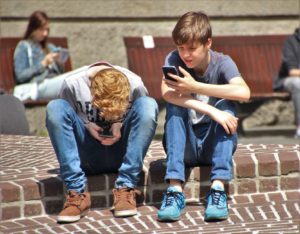
The kids and I went to the Largo Central park recently and I was taken aback. Being a popular park on a Saturday afternoon, there were hundreds of people there; hundreds of adults. The kids and I played in the playground and walked all around the park. Out of all the adults we saw, only eight of them were not on their phone. Eight. In my humble opinion, that is a sad.
I’ll be honest, I heard a few of them discussing Pokemon; one being a mom with her two kids. When it comes to games, I guess it’s good that it gets them outside and walking around enjoying the sunshine and others. However, I cannot recommend walking while looking at your phone. i had to stop, stop my kids, pull them out of the way countless times for individuals walking while staring at their phones oblivious to their surroundings.
Allow me to say, this is not a rant. It is simply a trend that I observe, a course that could use some correction. Our phones and devices are great! A web of information, entertainment and amusement is at our fingertips. I ask, at what cost?
In a world in which we are more connected than ever, we have lost contact with those around us. When we go out to dinner, most of the others around us are on their tablet or phone. Kids are playing games or watching tv on their devices. It has become a rarity to see two people or a family conversing with one another, enjoying each other’s company and being fully present in the moment.
Ease of communication is great! We can communicate with people around the world virtually instantly. If an issue creeps up at work, we can get an email while we’re on the beach and begin addressing it. What have we lost with these advances? Are you able to disconnect when your go out to dinner? While you’re at the doctor’s office waiting to be seen (as a kid I loved working through the “Highlights” magazines)? Or while you’re away on vacation trying to decompress from work?
All of this leads me to here: how may we stay connected digitally as needed, but disconnect enough to connect with others on a deeper level? As humans, we’re naturally social beings. There have been many species of Homo throughout history. Why were Sapiens successful and the only remaining Homo species? Homo Sapiens have the ability to be social and work in large groups. We could work together in large groups across vast territories. This ensured the success of Sapiens over the other Homo species.
I recently heard a fact that really surprised me. What has the biggest impact on our longevity? The answer may not surprise you now given what we have been discussing thus far in the article, it’s our social life. My first thought was our diet and activity. It makes sense though. Your social life has a large impact on many aspects of you from your activity level to your mood and emotions. In particular, your perception of loneliness. An introvert may be content with little human interaction and not perceive themselves as lonely where an extrovert may be in the center of a room full of people yet still feel lonely. How do you perceive your own loneliness?
There is a plethora of studies and research out there on an increase in depression rates among the younger generations; I am not going to quote any particular one. Why do we see this spike? I don’t feel it’s any one particular things, but many things leading to us be out of touch with those around us. I am all for Social Media when used properly. However, when you pull up your social feeds and scroll through feeling jealous of others, how does that benefit you? How does it connect you on a deeper level with others?
Technology isn’t bad. Mobile phones are great; I can call my family anytime I like and if I want to research something, I can do it instantaneously. We simply need to be cognizant of how we’re using our devices. What are we gaining but more importantly, what are we losing?
Some food for thought on your day. There’s a lot more to come on this so stay tuned. Also, please share any insight you have, all is appreciated!
Keep Smiling.

Recent Comments